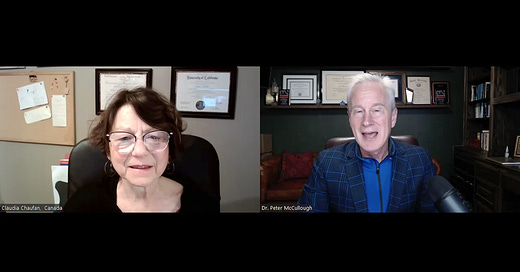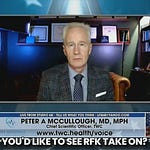By Peter A. McCullough, MD, MPH
College campuses have been the traditional environments for freedom of speech, expression of new social norms, and of course, protest. Why did university students so readily accept a vaccine that offered little theoretical benefit and real safety concerns especially in their age bracket? Approximately 30% of college and university students contracted COVID-19 as a mild illness in 2020 before vaccines arrived, and yet, many universities around the world and most in Canada mandated the novel genetic products for students. With the power to shut off internet access, disenroll, and destroy an educational career, students complied with vaccination. What was the sociological impact of isolation, pressure, coercion, and the threat of reprisal? I sat down with Canadian physician sociologist and university professor, Claudia Chaufan, MD, PhD, Associate Professor, Health Policy & Global Health, York University, who has published extensively on this novel sociological experiment. You are going to be amazed at what she has found in her research. Mass protests never occurred because the first move was to isolate students off campus and online for classes. The indoctrination that happened next and was fully exposed in Chaufan’s interviews and research was stunning. Here is an excerpt from one of her studies:
“For these participants, the perception that unvaccinated people were unsafe and morally defective continued even when, over time, claims from trusted sources - public health officials or medical personalities - began to clash with their experiences (e.g., developing Covid-19 after multiple doses of vaccines). Indeed, for them vaccination status was an indicator of desirable social and moral characteristics, so regardless of these experiences they continued to prefer socializing only with other vaccinated people. In the revealing words of one participant: I admit that personally, I’m still more comfortable around vaccinated people because it also signals something about that person…I trust vaccinated people more to be careful and to be just safer to be around. Because I trust them to be generally more pandemic cautious and to be doing things like masking and distancing and not going to huge super spreader events.”
Students actually took on the moralistic fallacy of vaccination for the greater good! They presumed the vaccines were safe and effective with no critical thinking and in the face of regulatory warnings that the vaccines caused myocarditis, blood clots, and death! They indicated that it was important for family, friends, and their circles to be fully vaccinated. The Bio-Pharmaceutical Complex as masterminds of this giant social experiment must have been thrilled with the result!
Please subscribe to Courageous Discourse as a paying or founder member so we can continue to bring you the truth.
Peter A. McCullough, MD, MPH
President, McCullough Foundation






















Share this post